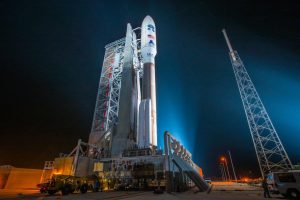4 May 2018

The GOES-R geostationary weather satellite (now known as GOES-16) launched from Cape Canaveral Air Force Station, Florida, on November 19, 2016.
Credit: NOAA.
WHAT: Members of the media are invited to attend a briefing and Q&A from NOAA researchers on how the agency’s scientists are teaming up with private industry and other public partners to advance science to improve the economy. NOAA researchers will discuss partnerships to build and launch the world’s most advanced satellites, improve drinking water quality, boost oyster hatchery production, and reduce consumer costs in electric transmission. Members of the media can attend in-person or via webinar.
WHO:
- Dan Lindsey, Senior Science Advisor, GOES-R satellite program, NOAA Satellite and Information Service
The next generation of weather observation satellites - Kelli Paige, Executive Director, Great Lakes Observing System
Helping Great Lakes municipal water treatment agencies improve public drinking water quality - Diane Kapareiko, microbiologist, NOAA Northeast Fisheries Science Center, Milford Lab
A natural probiotic that reduces disease in oyster hatcheries - Ken Fenton, meteorologist, NOAA Earth System Research Lab
Increased, safe transmission of electric power that can reduce consumer costs
WHEN: Thursday, May 17, 2018, 1:00 to 2:00 p.m. ET
WHERE: American Geophysical Union, 1 Thomas Circle NW, 9th Floor, Washington, D.C. 20005
COST: Free
REGISTER: Media coming in person: Please RSVP by Tuesday, May 15, at 12 noon ET, to Monica Allen, [email protected].
WEBINAR: Media unable to join in person can join the webinar by registering at bit.ly/NOAApartners. You will receive an email with the information needed to access the webinar online or by telephone. We recommend joining online for the Q&A portion for journalists.
###
The American Geophysical Union is dedicated to advancing the Earth and space sciences for the benefit of humanity through its scholarly publications, conferences, and outreach programs. AGU is a not-for-profit, professional, scientific organization representing more than 60,000 members in 139 countries. Join the conversation on Facebook, Twitter, YouTube, and our other social media channels.
Lauren Lipuma
+1 (202) 777-7396
[email protected]
NOAA Contact:
Monica Allen
+1 (301) 734-1123
[email protected]